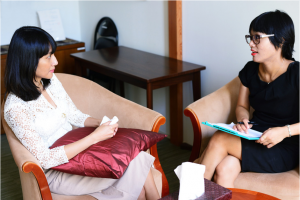
Anxiety disorders are one of the most common mental- health diagnoses in the United States. Forty million adults experience some form of anxiety every year. It is our prehistoric lizard brain, that is giving us a false sense of danger. Furthermore, anxiety is affected by a variety of factors, including genetics, brain chemistry, personality, and life events/environment. The good news is anxiety is highly manageable. With treatment and lifestyle changes, relief is possible. Below are some ways to help manage the symptoms of anxiety.
Relaxing Self-Care

If you are experiencing anxiety symptoms, exam your self-care routine. Self-care has been a buzzword for a couple of years now for good reason. We are so busy with work and family life, that we put our needs last, causing burnout and other mental and physical health issues. In this busy world, taking time out to care for yourself will help be more centered and feel more energized to take on your day. Self-care looks different for everybody. For some people, self-care might be vegging out and watching reality shows and for others, it might be working out. Take time each day to do what relaxes you. For me, it is reading, hiking, painting, cardio, yoga, and watching light-hearted shows on Netflix. Each night, after a long day, my husband and I curl up on the sofa and watch our shows or movies. This is the self-care routine that we do together.
Get in Touch With Your Feelings


Feelings of anxiety can occur when we are suppressing our feelings and are not aware what is the root of the problem. Writing in our journal or talking to a trusted friend can help us process a situation or a past event that has been bothering us. Sometimes anxiety is our body’s way of telling us that we are exhausted, burned out, or we are faced with a situation that we are not sure how to handle. Taking a day off from work and rest, reflect on your current situation, or do something that makes your heart happy might be just what the doctor ordered.
Practicing Deep Breathing
Our breath is the path to our serenity. The correct way to breathe is to have our breath slowly reach our stomach and slowly exhale out. However, when we get stressed out, our breath often reaches down to our chest. This causes us to build up carbon dioxide in our body, which can cause panic attacks and anxious feelings. Practice taking 10 deep breaths daily will help you breathe correctly during stressful situations.
Meditation and Yoga

Studies show that yoga and meditation help decrease anxiety symptoms by producing serotonin levels to manage anxiety and depression symptoms. Meditation and yoga are not all the same. There is power yoga, light yoga, aerial yoga, hatha yoga, and yoga-pilates fusion. Furthermore, there are different times of meditation that include mindfulness, transcendental meditation, mantra meditation, and more. Explore various forms of yoga and meditation to see which one is right for you
Exercise

It is no secret that exercising has a lot of health benefits such as improving heart health, increasing energy, losing weight, and building muscle. Did you know that exercise can have the same effect as an antidepressant? It releases feel-good chemicals such as endorphins and serotonin. Exercise does not have to be strenuous. It can be taking a walk, dancing around the house and singing, or going for a swim. Always check with your doctor before starting any kind of exercise program.
Examine Your Diet

Past studies have shown that processed foods, foods high in sugar, and fried foods can cause or increase anxiety. Eating rich greens and whole grains can increase serotonin levels, which help ease anxiety. Also, eating often and drinking plenty of water can decrease the likelihood of nervousness due to a drop in blood sugar. Keep track of any food sensitives you may have such as gluten, dairy, or soy. An allergic reaction can cause symptoms of anxiety.
Talk to a Therapist

The first step you may want to take if you are experiencing anxiety is to talk to a licensed therapist. A therapist will help you process your emotions, help you identify triggers, and build some good coping skills to help manage anxiety. Just like going to a doctor if we break a leg, going to a therapist if we are experiencing uncomfortable emotions, experienced trauma, or/and are dealing with stressors. A therapist will help you find your zen and help you live a more fulfilling life.
